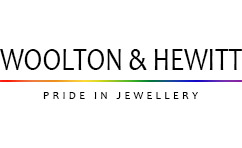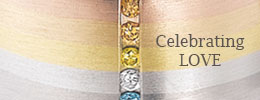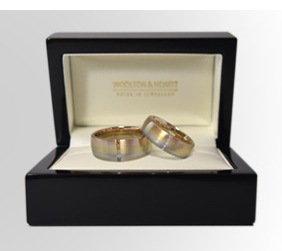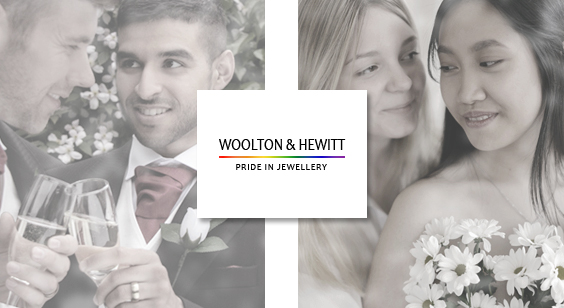Once again may we say "MANY CONGRATULATIONS!" to you both. Your
beautiful symbols of love will now journey through life with you.
Just like all of us, your rings will show signs of age and use.
Contact with everyday objects will leave marks, scratches and
dents. Over time these blend together developing an appealing soft
patina. We recommend embracing this inevitable change as part of
growing old together.
To help keep your rings in the best possible condition the
following advice should help. However, further mitigating measures
may be necessary depending on your work and lifestyle. Ultimately,
you must decide on the balance to strike between wearing your
rings and protecting them.
Please note that our care advice is general and the sources of
potential damage given are not exhaustive. We recommend the
cautious approach of removing your rings in any and all situations
where you consider damage is a possibility. Our advice is for
gold, palladium and platinum, and diamonds. For other gemstones
and other materials you should seek relevant specialist advice.
 Insurance for your rings
Insurance for your rings
You should consider insuring your rings against loss, damage and
theft. For diamond rings please do ensure that the loss of a
valuable diamond is definitely covered. Keeping the replacement
value up-to-date is important too. Before travelling, please make
sure that your insurance (existing and/or travel policy) covers
the relevant locations, activities, and values. It is also good
practice to consider how best to minimise the risk of theft and
damage to your rings before departure.
 Handling your rings
Handling your rings
Moving your rings from one safe place to another should be done
with your full attention and, just in case, over a soft rather
than a hard surface. This will minimise any damage should they be
dropped.
When not being worn your rings should be kept in a safe and secure
location, on a soft surface, separate form other items. A ring
case or pouch would be ideal. Never put your rings down onto a
tiled or metal surface, and never into a pocket or wallet or purse
where they will be scratched by coins and keys. Do not attach your
ring to your keyring because, even if protected in a pouch, the
danger posed by sharp steel keys is extremely high.
Before washing your hands make sure the sink plug is firmly in
place. Soap will make it much easier for your rings to slip off
and an open drain could prove disastrous. In a confined space like
a shower cubicle there is an increased chance that you may strike
your ring against a hard surface and cause physical damage. And
showers have drains too. Take extra care when using public
facilities.
 Abrasion and pressure will damage your rings
Abrasion and pressure will damage your rings
Precious metals are soft compared to other metals and ceramics.
For example, stainless steel keys, taps, door handles, and
cookware will inevitably cause scratches and dents. Gradually your
rings will take on a soft patina that reflects the ageing process.
Diamonds are extremely hard but they are brittle and can be
chipped or even broken. Again, this is natural wear and tear and a
feature of normal use.
At the gym and other rough stuff
It is important to remove your rings before strenuous activates
including DIY, gardening, garage work, other forms of manual work,
for rough outdoor sports and when in the gym. Wearing gloves will
not prevent the high pressures generated on your hands and fingers
from, potentially, deforming your rings and dulling their finish.
While doing washing up, contact with ceramics, cookware, cutlery
and abrasive cleaning sponges will cause marks to you rings.
Your wedding and engagement rings are subject to
mechanical forces that push, pull and try to twist them out of
shape. Gripping everyday objects like a gear level or a handle
exerts considerable pressure on your rings. Gym equipment,
rackets and golf clubs, tools, lifting heavy objects, and
gardening all have the same effect. Rings can also become
snagged and pulled out of shape. Rings can't withstand
everything that we can throw at them so reducing exposure to
these "dangerous" environments is recommended.
 Personal care and cosmetic products
Personal care and cosmetic products
Products that are safe for the skin such as soap, shampoo, gel,
hairspray, make-up, and sun cream, are safe for your rings.
However, they can leave a residue which will dull your rings and
accelerate the accumulation of dirt from the environment. The same
applies to contact with food and food preparation. This can be
mitigated by delicate cleaning as described below.
 Care for your diamonds
Care for your diamonds
Diamond set rings should be picked up from the side or from the
base. Avoid handling the diamonds themselves as this adds to the
wear and tear of the settings. Contact from fingers also leaves
oil behind which will reduce the brilliance of your diamonds.
Regular inspection
It's important to have diamond rings regularly checked by a
jeweller because the settings are subject to wear and tear. This
is to ensure the security of the diamonds. Additionally, if you
think your ring feels different, or if you've given it a worrying
knock, then do have it examined as soon as possible. The last
thing you want is to lose a diamond.
For rings with large or exposed diamonds we
emphasise the need to keep them away from the activity and
environments listed in this guide and never to put them down
onto hard surfaces. On your finger or in a ring case are the two
best places to keep your rings.
 Cleaners and chemicals can damage your rings
Cleaners and chemicals can damage your rings
It is very important to remove your rings before using corrosive
chemicals such as chlorine and chlorides, ammonia and ammonium
compounds, acids and alkalis, bleaches and oxidizing agents, and
all reactive substances.
Household chemicals
Kitchen, bathroom and other household cleaners, drain cleaner,
polishing compounds, super-glue, dyes, nail polish remover,
solvents, and all similar products can cause damage to your rings.
We recommend avoiding contact between these classes of household
chemicals or, when it's unavoidable, wearing appropriate
solvent-proof gloves and thoroughly washing your hands and rings
afterwards.
Hand sanitisers
Alcohol-free sanitisers contain benzalkonium chloride, which has
many other names including alkyldimethylbenzylammonium chloride.
It is a chlorine compound and therefore presents a risk of
reacting with metals and thereby causing damage to rings and
jewellery.
Purely alcohol based products are unlikely to affect precious
metals and diamonds. However, they may leave behind a deposit that
dulls the appearance of your rings and can facilitate the
accumulation of dirt.
In practice it is not possible to always know the exact details of
the sanitiser you are using. We therefore recommend:
- avoid the use of alcohol-free benzalkonium chloride based
products where possible,
- after using any hand sanitiser, at the earliest opportunity,
thoroughly wash your hands (i.e. your rings) in warm soapy water,
- at the end of the day remove any residual sanitiser by cleaning
your rings following the advice in the section below,
- if exposure to a benzalkonium chloride product cannot be avoided
we think it's best not to wear your rings during times of such
exposure.
Swimming
For caution, particularly if a frequent swimmer, you may want to
remove your rings before using a chlorinated pool. It's advisable,
following exposure to even mildly chlorinated water, to rinse your
rings thoroughly in fresh water.
 Cleaning your rings
Cleaning your rings
To keep your rings looking great you should clean them in warm
soapy water. Mix a few drops of mild liquid soap with warm water
in a plastic bowl. Don't do it directly in a ceramic or steel sink
as both are very hard and will scratch your rings and may chip
your diamonds. Clean one ring at a time. Soak for about 15 minutes
then very gently use a small soft brush to remove any build up of
dirt.
If your ring is diamond set use the soft brush to gently agitate
round the front of the settings and, if accessible, also brush
very gently behind. Refill the bowl with clean water and rinse
your rings. Always beware of the drain.
Dry with a clean soft lint-free cloth, rubbing the ring gently and
briefly. For diamonds it is better to dab as you don't want to
leave fibres snagged in the settings.
For the final finish you may want to buff your rings for a few
seconds with a specialist polishing cloth available from companies
including Goddards, Hagerty and Town Talk. Importantly, for rings
made of white gold which is usually rhodium plated, or where the
finish is brushed, use only an extremely light pressure and on a
very infrequent basis. This is because polishing will erode the
ring's surface layer, thereby removing the rhodium plating and/or
reducing the brushed effect.
Please be aware that a polishing cloth will not remove scratches
and dents, it can only bring back some brightness to previously
polished surfaces.
Polishing is a form of wear and tear - it rubs
away a tiny amount of the surface. Little by little polishing
erodes brushed finishes, patterns, engraving, hallmarks, rhodium
plating, settings and even the shape. If you do want to polish
we suggest a brief light rub on an infrequent basis.
Following this advice we're sure you, your
partner, and your fabulous rings will enjoy a very happy life
together!
 The WOOLTON
& HEWITT Care Guide is available as a PDF document - Download
The WOOLTON
& HEWITT Care Guide is available as a PDF document - Download



 The WOOLTON
& HEWITT Care Guide is available as a PDF document -
The WOOLTON
& HEWITT Care Guide is available as a PDF document - 










